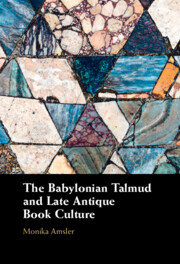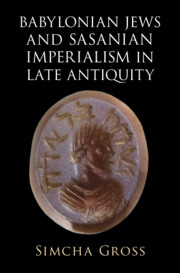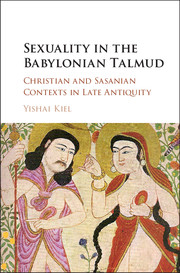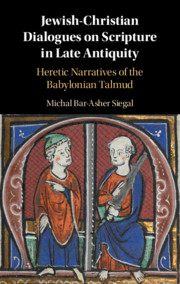The Babylonian Talmud and Late Antique Book Culture
- Author: Monika Amsler, Universität Bern, Switzerland
- Date Published: April 2023
- availability: Not yet published - available from October 2024
- format: Hardback
- isbn: 9781009297332
Hardback
Other available formats:
eBook
Looking for an inspection copy?
This title is not currently available for inspection. However, if you are interested in the title for your course we can consider offering an inspection copy. To register your interest please contact [email protected] providing details of the course you are teaching.
-
In this book, Monika Amsler explores the historical contexts in which the Babylonian Talmud was formed in an effort to determine whether it was the result of oral transmission. Scholars have posited that the rulings and stories we find in the Talmud were passed on from one generation to the next, each generation adding their opinions and interpretations of a given subject. Yet, such an oral formation process is unheard of in late antiquity. Moreover, the model exoticizes the Talmud and disregards the intellectual world of Sassanid Persia. Rather than taking the Talmud's discursive structure as a sign for orality, Amsler interrogates the intellectual and material prerequisites of composers of such complex works, and their education and methods of large-scale data management. She also traces and highlights the marks that their working methods inevitably left in the text. Detailing how intellectual innovation was generated, Amsler's book also sheds new light on the content of the Talmud. This title is also available as Open Access on Cambridge Core.
Read more- Offers a new thesis of how the Talmud came into being by comparing the text's structure with contemporary education and book composition
- Accessible to readers, even for those who are not interested as much in the Talmud as they are in late antique book production and necessary data management
- Approaches the Babylonian Talmud as a 'simple' late antique book, thereby shifting focus from asking about halakhic (legal) ideas to asking about the resources, material and immaterial, that enable ideas
- This title is also available as Open Access on Cambridge Core
Reviews & endorsements
'In this exceptional book, Monika Amsler offers a new account of the Babylonian Talmud that centers the material dimensions of information technology and textual organization in Mediterranean antiquity. Amsler integrates a capacious range of sources from throughout Mesopotamia and the Mediterranean, spanning roughly from the first to sixth centuries CE, in order to locate rabbinic knowledge production in a broader - and often neglected - context. Amsler demonstrates exceptional command of a wide range of sources and contexts, combined with a keen sensitivity to the material and social dimensions of late ancient knowledge. The result is no less than an insightful and innovative reconceptualization of rabbinic literature.' Jeremiah Coogan, Assistant Professor of New Testament, Jesuit School of Theology, Berkeley, CA
See more reviews'This is an important, provocative, and challenging book. Amsler asks us to set aside what we think we know about the creation of the Babylonian Talmud and to begin again. From information collection, to filing and indexing, to the construction of arguments, Amsler situates the Talmud within the world of book production in the Roman world, and in particular within the production of large compendia in late antiquity, and in the techniques for arrangement and juxtaposition that were essential to literate, rhetorical education.' Hayim Lapin, Professor of History and Robert H. Smith Professor of Jewish Studies, University of Maryland
'Amsler has succeeded very well in making literary methods of classical late antiquity fruitful for the understanding of the Bavli, demonstrating the application of comparable methods in the excerpting of writings, the cataloguing of excerpts and their use in the creation of such a work. The textual example she has chosen illustrates this very well and is very instructive; there is much to learn from A.'s approach to the composition of many passages in the Bavli and her book is an important contribution; her assumption of extensive written precursors of the Bavli also has much in its favour.' Günter Stemberger, Judaica: Neue Digitale Folge
'It is a distinct pleasure to recommend Monika Amsler's well written and carefully argued new monograph, The Babylonian Talmud and Late Antique Book Culture, not despite this reviewer's strong disagreement with many of the claims made in the book, but because of them. Without strong and well-argued challenges to basic prevailing assumptions, the field of Talmud and rabbinics, like any other field of inquiry within the academy, will never advance.' Noah Benjamin Bickart, Bryn Mawr Classical Review
Customer reviews
Not yet reviewed
Be the first to review
Review was not posted due to profanity
×Product details
- Date Published: April 2023
- format: Hardback
- isbn: 9781009297332
- length: 243 pages
- dimensions: 235 x 158 x 24 mm
- weight: 0.6kg
- availability: Not yet published - available from October 2024
Table of Contents
Introduction
1. Chapter One
2. Chapter Two
3. Chapter Three
4. Chapter Four
5. Chapter Five.
Sorry, this resource is locked
Please register or sign in to request access. If you are having problems accessing these resources please email [email protected]
Register Sign in» Proceed
You are now leaving the Cambridge University Press website. Your eBook purchase and download will be completed by our partner www.ebooks.com. Please see the permission section of the www.ebooks.com catalogue page for details of the print & copy limits on our eBooks.
Continue ×Are you sure you want to delete your account?
This cannot be undone.
Thank you for your feedback which will help us improve our service.
If you requested a response, we will make sure to get back to you shortly.
×




